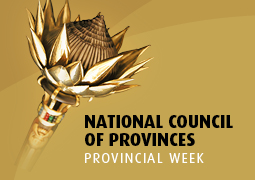
Permanent delegates to the National Council of Provinces (NCOP) will visit their respective provinces for the week-long (29 March to 1 April 2022) Provincial Week programme, under the theme “Assessing State capacity to respond to the needs of communities”.
The 2022 Provincial Week is a high-impact oversight programme aimed at responding to the challenges of state capacity in the provinces. It is further intended to afford Permanent Delegates to the NCOP with an opportunity to return to their provinces to assess delivery of services to citizens.
The NCOP delegates, together with their provincial legislature counterparts, will spend the week interacting with municipalities on interventions to improve governance challenges and the state of service delivery. This Provincial Week 2022 will allow each Provincial Delegations to concentrate on matters that affect the province in the national sphere of government.
The provincial focus areas which are aimed at addressing issues affecting each of the nine provinces are as follows:
Eastern Cape: Availability of land for farming and industrialization of hemp and cannabis/provision of adequate school infrastructure in rural areas and townships, including visiting township, rural and mud schools.
Free State: Provision of water and sanitation infrastructure/visiting water and sanitation projects, as well as water reticulation sites and special economic zones.
Gauteng: Provision of integrated housing infrastructure, including measures to address the housing backlog and create integrated and sustainable human settlements.
KwaZulu-Natal: Capacity to fight against crime, including the state of police stations in township and rural areas and their resourcing.
Limpopo: Capacity to address structural constraints facing small-scale farmers and SMMEs, especially in the agricultural sector to assist them to deal with biophysical factors such land ownership, market access and affordable support to deal with other price of inputs such as fertilizer, herbicides, irrigation, product transport, and other natural constraint such as global warming.
Mpumalanga: Provision of safe and reliable scholar transport in rural areas, including mechanisms to control overloading, roadworthy vehicles, discrepancies on the number of learners and route distances, late transportation of learners, as well as fiscal wastages and corrupt practices in the provision of scholar transport.
Northern Cape: Provision of safe drinking water and assist communities that are affected by drought, including visiting water provision projects, dams, water reticulation sites and provincial storage weirs, and as well as crime and drivers for crime.
North West: Investment in mining/renewable energy/state capacity to build, upgrade and maintain roads, including visiting road infrastructure projects.
Western Cape: Provision of housing infrastructure, including measures to address the housing backlog and create integrated and sustainable human settlements.

